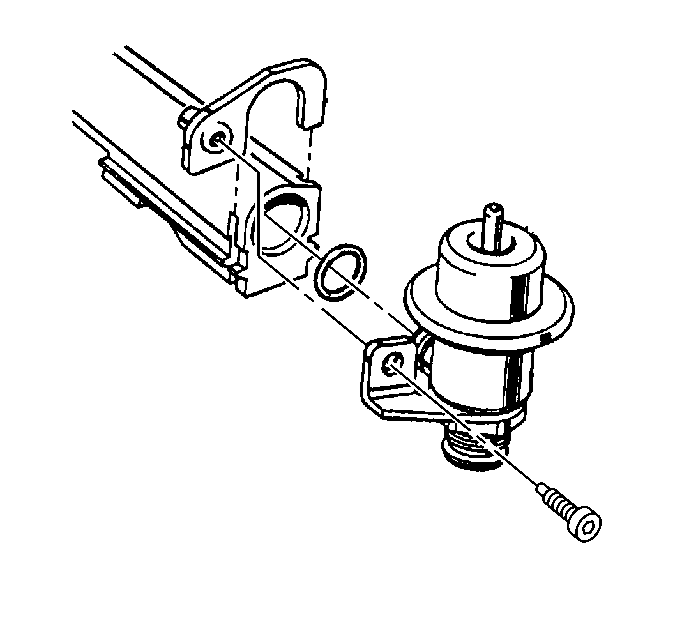Removal Procedure
- Relieve fuel system pressure. Refer to Fuel Pressure Relief .
- Remove the upper intake manifold. Refer to Upper Intake Manifold .
- Remove the fuel pressure regulator vacuum line.
- Remove the fuel pressure regulator retaining screw.
- Using a shop towel to catch any spilled fuel, lift and twist the fuel pressure regulator in order to remove the fuel pressure regulator from the fuel rail.
- Remove the retainer and spacer bracket from rail and discard.
- Remove the fuel pressure regulator from engine fuel return pipe.
- Remove the fuel pressure regulator inlet O-ring and discard.

Installation Procedure
Caution: Connect the fuel return line before tightening the regulator attaching screw in order to prevent the regulator from rotating. Rotation of the regulator could damage the retainer and spacer bracket and lead to a fuel leak at the regulator inlet.
Notice:
• Do not use compressed air in order to test or clean a fuel pressure
regulator as damage to the fuel pressure regulator may result. • Clean the fuel pressure regulator filter screen with gasoline
if necessary. • Do not immerse the fuel pressure regulator in a solvent bath in
order to prevent damage to the fuel pressure regulator.
- Filter screen for contamination. If contaminated, remove and discard filter screen.
- Lubricate new pressure regulator inlet O-ring with clean engine oil and install on regulator inlet.
- Install the fuel return pipe to regulator.
- Install the new retainer and spacer bracket into slot on fuel rail.
- Install the pressure regulator to fuel rail.
- Install the fuel pressure regulator vacuum line.
- Install the pressure regulator attaching screw.
- Inspect and verify that retainer and spacer bracket is engaged in slots in fuel rail. Grasp and pull on regulator to ensure that it is properly seated.
- Install the upper intake manifold. Refer to Upper Intake Manifold
- Install the fuel filler cap.
- Inspect for leaks:

Tighten
Tighten engine fuel return pipe nut to 17 N·m (13 lb ft).
Notice: Use the correct fastener in the correct location. Replacement fasteners must be the correct part number for that application. Fasteners requiring replacement or fasteners requiring the use of thread locking compound or sealant are identified in the service procedure. Do not use paints, lubricants, or corrosion inhibitors on fasteners or fastener joint surfaces unless specified. These coatings affect fastener torque and joint clamping force and may damage the fastener. Use the correct tightening sequence and specifications when installing fasteners in order to avoid damage to parts and systems.
Tighten
Tighten pressure regulator attaching screw to 8.5 N·m (76 lb in).
Notice: Use the correct fastener in the correct location. Replacement fasteners must be the correct part number for that application. Fasteners requiring replacement or fasteners requiring the use of thread locking compound or sealant are identified in the service procedure. Do not use paints, lubricants, or corrosion inhibitors on fasteners or fastener joint surfaces unless specified. These coatings affect fastener torque and joint clamping force and may damage the fastener. Use the correct tightening sequence and specifications when installing fasteners in order to avoid damage to parts and systems.
| 11.1. | Turn the ignition switch to the ON position for 2 seconds. |
| 11.2. | Turn the ignition switch to the OFF for 10 seconds. |
| 11.3. | Turn the ignition switch to the ON position. |
| 11.4. | Check for fuel leaks. |
